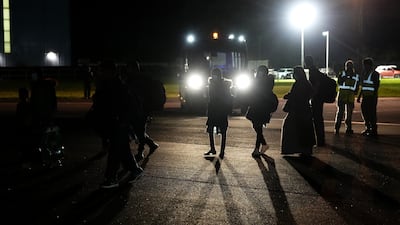Nearly three years ago, scenes of Afghans rushing the gates of Kabul’s airport to escape as their country fell to Taliban rule shook the world. More than 120,000 were flown out with help from dozens of foreign governments, international agencies, NGOs and private citizens. Back then, every successful evacuation was cheered in the West.
As The National revealed this week, Britain’s recently defeated Conservative government had restarted this evacuation effort 10 months ago, with great success. But instead of considering it a badge of honour, it treated it how it might treat mark of shame.
In October of last year, the risk to Afghans fearful of Taliban persecution was renewed when Pakistan, a major host country for Afghan refugees, began expelling them en masse back to Afghanistan. At the time, The National spoke to NGO workers on the Afghanistan-Pakistan border, who confirmed that many of the people expelled had been approved for resettlement in western countries, such as Britain, and were in Pakistan temporarily, waiting for their cases to be processed.
Afghanistan’s Taliban administration has formally issued an amnesty to all Afghans previously employed with foreign forces and has denied it seeks to punish any returning from Pakistan. But in the past three years, there have been several stories of such Afghans being targeted.
In response, the UK government began Operation Lazurite, which sought to evacuate Afghans who had worked with British forces from Pakistan and Afghanistan and resettle them in Britain. It has been a resounding success; to date, Lazurite has relocated about 5,000 Afghans, temporarily accommodating them on UK military bases.
In normal times, last month’s UK election might have seen this success trumpeted loudly by the Conservative party. Instead, as The National has revealed, the operation was intentionally kept under the radar by officials in Whitehall so as not to tarnish the government’s image of being tough on migration.
That image was spurious anyway; under 14 years of Conservative rule, Britain’s net migration figures more than doubled. But the fact that a valiant effort such as Lazurite could be a source of embarrassment speaks to how toxic Britain’s political environment has become. As the far right grows as a force in national politics – the recent election of Reform UK leader Nigel Farage to Parliament was a watershed moment – discussion of immigration has become extremely fraught.
That became even more apparent in the aftermath of a grisly crime at a children’s dance studio in the northern English town of Southport on Monday. A Cardiff-born teenager stabbed to death three young girls and injured several others, for reasons yet unknown. The next day, far-right rioters descended on Southport’s mosque, throwing bricks, fireworks and bottles and setting a police vehicle alight. They were incensed by social media posts which incorrectly suggested the stabbing was carried out by an asylum seeker with Islamist motives. Even if that were the case, lawless acts of misplaced vengeance on a local mosque would not be any less appalling.
The past era in the UK was drenched in nativism, with some of the country’s leading politicians routinely sowing division along racial and ethnic lines. It not only brought the country Brexit, but saw British extremists born of immigrant parents stripped of citizenship and the spouses of lower-income British citizens denied family visas. The new government seeks to send a signal to the rest of the world that Britain is turning the page. What is needed is a whole new chapter. But undoing years of divisiveness and fearmongering won’t be easy.


